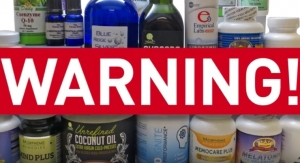By Gregory Stephens, Windrose Partners, & Sanford W. Bigelow, Vanguard Global Associates LLC06.03.19
In an April 30th statement, Acting FDA Commissioner Ned Sharpless provided a glimpse into FDA’s plans to usher the U.S. into a “new era of smarter food safety.” Sharpless made it clear that FDA feels “it’s time to look to the future of food safety.” As we consider potential changes in food safety regulations and enforcement, this new era is likely to be more than incorporating new technologies touched on in his statement. While it remains unclear exactly what changes FDA could pursue, it is generally agreed that regulatory goals will include increased enforcement against dietary supplements containing new dietary ingredients (NDIs).
In this month’s column Windrose Partners and Vanguard Global Associates take a practical look at the U.S. safety requirements for nutraceutical products, whether they are dietary supplements, conventional foods, foods for special dietary use (FSDU), or medical foods. These safety requirements apply to products under development as well as those already commercialized, and are critical to achieving regulatory acceptance and optimizing market opportunities.
Are Your Products Safe?
How do you know if your food, supplement, or medical food is safe for use? It depends largely on its composition and intended use. The following overview of the U.S. regulatory requirements for such products provides context in assessing product composition and directions for use, and product and ingredient safety, based on the intended use of the product. The general categories of food products regulated by the FDA are: conventional food, dietary supplements, foods for special dietary use (e.g., foods intended for weight loss), and medical foods, as well as (not discussed herein) infant formulas.
Composition & Use for the Product
Product composition is largely reflected by its formulation and specifications; products are typically composed of multiple ingredients identified and sourced from purified chemicals (e.g., vitamin C), chemical mixtures (e.g., mixed tocopherols), and botanical source (e.g., Panax notoginseng root extract). Additional information is needed, depending on the form (e.g., beverage), the composition, stability, specifications and certificate of analysis, ingredient composition as recognized in official compendia (Food Chemicals Codex monographs) (FCC 2019); daily intake of active nutritional and other ingredients, use level(s), current regulatory status (if any) of the ingredient, intended technical effect, directions for use, and nutritive value are essential to characterize the product for determining regulatory status, as well as its safety and commercial status.
Confirming Safety of Food Ingredients & Formulas
A brief overview of the U.S. regulatory requirements highlights the safety standards and evidentiary requirements for ingredients used in food, medical food, and supplement products. All food ingredients must be 1) approved by the FDA as a food additive or color additive, 2) be prior sanctioned by the FDA, or 3) be Generally Recognized As Safe (GRAS) either by the FDA or self-determined by a panel of experts qualified by training and experience.
A dossier regarding the safety of the ingredients, separate from the review of regulatory requirements and product claims, is typically completed prior to commercial introduction of the medical food product. The safety standard component requires that for the use of a substance to be determined as GRAS, competent scientists must be reasonably certain the substance is not harmful under its intended conditions of use (21 CFR 170.3(i); 62 Federal Register 18,937 at 18,940), which has served well as a reasonable and acceptable, time-tested standard for determining the safety of ingredients when consumed as part of the diet.
A supplement is considered safe if it does not present a significant or unreasonable risk of illness or injury under conditions of use recommended or suggested in labeling, or under ordinary conditions of use (21 U.S.C. §342, 21 CFR 190.6). NDIs used in supplement products can be considered safe unless there is inadequate information to provide reasonable assurance that such an ingredient does not present a significant or unreasonable risk of illness or injury, a safety standard used by the FDA to determine acceptability for NDI safe use (FDA 2016b). A supplement that contains a new dietary ingredient shall be deemed adulterated under section 402(f) unless it meets one of the following requirements: 1) the dietary supplement contains only dietary ingredients which have been present in the food supply as an article used for food in a form in which the food has not been chemically altered, and 2) there is a history of use or other evidence of safety establishing that the dietary ingredient will reasonably be expected to be safe when used under the conditions recommended or suggested in the labeling of the dietary supplement (21 U.S.C. §342, 21 CFR 190.6).
Historically, as routine practice, the determination of safety for both food and supplement ingredients has been achieved through GRAS determinations. The GRAS self-determination process is used for establishing the safety and regulatory acceptability of food ingredients, and has also been used for determining safe use for supplement ingredients. For example, the FDA has affirmed the GRAS status for the food and supplement ingredient uses of glyceryl palmitostearate such as in tablets (21 CFR 184.1329, published at 60 Federal Register 63,621 on Dec. 12, 1995); and has established precedent for determining the GRAS status for ingredient use in both food and supplement products. Thus, because the FDA has GRAS-affirmed the food and supplement use for the same ingredient, the precedent has been set to determine the GRAS status of ingredients intended for use in food and/or supplement products.
Regarding potential supplement ingredient intake, ostensibly, the standard of safety in the Dietary Supplement Health and Education Act (DSHEA) is linked more directly to the conditions of use recommended, or suggested labeling in the supplement product, than it is for food ingredients. Thus, because the daily intake of an ingredient may be consumed in one serving, safety evaluations for supplements have typically been more focused on the directions for use, as compared to a view of the broad intake of food ingredients in many food items with relation to overall dietary intake patterns.
In terms of intended use and dietary intake, the “common use” approach employed in GRAS determinations share many elements with the “history of human use” considerations used to support NDI use in supplements. The obvious difference is that GRAS determinations employing the common use approach relate to ingredients that have been used before 1958, compared to FDA guidance (2016a) that requests published reports as compelling evidence that daily, chronic use in large population groups for a period of 25-plus years be used to support safe use of NDIs in supplements. DSHEA directs the FDA to consider history of use and actual supplement product use (as defined in labeling).
Considering the daily intake for an ingredient can be consumed in one supplement serving, apportioning the same daily intake into multiple food categories can be problematic because of differences in eating frequencies, serving sizes, and self-limited use levels among the food categories. FDA (1998, 1999) divided the daily intake into four food categories in its health claim approval for soy protein and blood cholesterol (a daily intake of 25 grams of soy protein apportioned to four servings of food daily derives 6.25 grams of soy protein per serving of food). The dietary basis for this apportioning was the FDA recognized the U.S. population eats an average of 20 servings of food daily (six servings in each of three meals, plus two serving for a snack). Thus, among other considerations, the manufacturer needs to develop a rationale on how to divide the daily intake for an ingredient into use levels for multiple food categories.
Even though these safety standards differ slightly, on a practical basis, the GRAS self-determination process has been used for establishing the safety and regulatory acceptability for both food and supplement ingredients. As defined in 21 CFR §170.3, the eligibility for classification as GRAS can be determined through two approaches: scientific procedures and/or common use.
The scientific procedures approach requires the same quantity and quality of evidence as that required for a food additive petition (FDA 2007). The common use approach is used for substances with a widespread history of use in food prior to Jan. 1, 1958, through experience based on common use in food (21 CFR 170.30).
The evidence for a GRAS determination must primarily be publicly available (e.g., articles published in scientific journals, government reports, etc.) to achieve and support general recognition (the GR part of GRAS) by the scientific community. Technical evidence of safety includes the chemical identity of the substance, the method of manufacture, analytical data on composition and specifications, estimates of dietary exposure, and safety data from animal and human studies.
GRAS: Self-Determine or Voluntary FDA Notification
With self-determination, manufacturers often hire an expert consultant external to their firms to prepare a GRAS dossier for the ingredient (FDA 2017a,b). The consultant convenes a panel of experts selected for their training and experience to address the issues identified during GRAS dossier preparation. At the conclusion of the process, the panel develops and signs a consensus statement of their conclusions that embodies the issues raised during the panel review, and this statement forms the basis of the GRAS self-determination. Both the dossier and statement of conclusions can be used by manufacturers to aid in the technical sales aspect of ingredient marketing.
Alternatively, as finalized in August of 2016, the FDA (2016a) operates a voluntary notification program in which primarily ingredient suppliers have supplied the agency with a copy of their own GRAS determination (81 Federal Register 54,960). In this voluntary procedure, the FDA accepts the GRAS self-determination, assigns a GRN number, places the GRAS determination on the FDA website, and typically takes about 6 months to review the GRAS determination. If all issues are resolved, then the FDA issues a “no questions” response letter acknowledging the supplier’s GRAS determination on the agency’s website. FDA does not conduct its own GRAS determination, but recognizes the supplier’s notification comprising the GRAS determination. The supplier typically uses the “FDA has no questions” acknowledgement to market its ingredient to potential customers in the food and supplement industries.
To operationalize the above regulatory requirements regarding ingredient and product safety, firms are legally allowed to market the supplement product if they meet one of three criteria: 1) the ingredient was lawfully marketed as a dietary supplement prior to Oct. 25, 1994 (when DSHEA was passed), 2) if the ingredient was introduced into interstate commerce on or after Oct. 25, 1994, submit a “new dietary ingredient” notification to the FDA, or 3) the manufacturer conducts a GRAS self-determination demonstrating that use of these ingredients in food and supplement products are generally recognized as safe (GRAS).
Food safety is more than a regulatory issue. Savvy nutritional companies leverage food safety to support their marketing message. Additionally, elements of product composition, specifically formulation and specifications, are key to product differentiation in the marketplace, intellectual property opportunities, and supporting transparency goals—all of which are integral to commercial sustainability in the competitive nutraceutical market.
References
Gregory Stephens
Windrose Partners
Greg Stephens, RD, is president of Windrose Partners, a company serving clients in the the dietary supplement, functional food and natural product industries. Formerly vice president of strategic consulting with The Natural Marketing Institute (NMI) and Vice President of Sales and Marketing for Nurture, Inc (OatVantage), he has 25 years of specialized expertise in the nutritional and pharmaceutical industries. His prior experience includes a progressive series of senior management positions with Abbott Nutrition (Ross Products Division of Abbott Laboratories), including development of global nutrition strategies for disease-specific growth platforms and business development for Abbott’s medical foods portfolio. He can be reached at 267-432-2696; E-mail: gregstephens@windrosepartners.com.
Sanford Bigelow
Vanguard Global Associates LLC
Sanford (Sandy) Bigelow, PhD, DABT, is principal at Vanguard Global Associates LLC (VGA), a leading-edge consultancy of experienced associates who work together to develop creative solutions to their clients’ challenges. VGA helps clients deal with the safety and claims aspects of commercializing their ingredients and products. Bigelow is Board Certified in General Toxicology (DABT), qualifying a practice in safety assurance and evaluation.
In this month’s column Windrose Partners and Vanguard Global Associates take a practical look at the U.S. safety requirements for nutraceutical products, whether they are dietary supplements, conventional foods, foods for special dietary use (FSDU), or medical foods. These safety requirements apply to products under development as well as those already commercialized, and are critical to achieving regulatory acceptance and optimizing market opportunities.
Are Your Products Safe?
How do you know if your food, supplement, or medical food is safe for use? It depends largely on its composition and intended use. The following overview of the U.S. regulatory requirements for such products provides context in assessing product composition and directions for use, and product and ingredient safety, based on the intended use of the product. The general categories of food products regulated by the FDA are: conventional food, dietary supplements, foods for special dietary use (e.g., foods intended for weight loss), and medical foods, as well as (not discussed herein) infant formulas.
Composition & Use for the Product
Product composition is largely reflected by its formulation and specifications; products are typically composed of multiple ingredients identified and sourced from purified chemicals (e.g., vitamin C), chemical mixtures (e.g., mixed tocopherols), and botanical source (e.g., Panax notoginseng root extract). Additional information is needed, depending on the form (e.g., beverage), the composition, stability, specifications and certificate of analysis, ingredient composition as recognized in official compendia (Food Chemicals Codex monographs) (FCC 2019); daily intake of active nutritional and other ingredients, use level(s), current regulatory status (if any) of the ingredient, intended technical effect, directions for use, and nutritive value are essential to characterize the product for determining regulatory status, as well as its safety and commercial status.
Confirming Safety of Food Ingredients & Formulas
A brief overview of the U.S. regulatory requirements highlights the safety standards and evidentiary requirements for ingredients used in food, medical food, and supplement products. All food ingredients must be 1) approved by the FDA as a food additive or color additive, 2) be prior sanctioned by the FDA, or 3) be Generally Recognized As Safe (GRAS) either by the FDA or self-determined by a panel of experts qualified by training and experience.
A dossier regarding the safety of the ingredients, separate from the review of regulatory requirements and product claims, is typically completed prior to commercial introduction of the medical food product. The safety standard component requires that for the use of a substance to be determined as GRAS, competent scientists must be reasonably certain the substance is not harmful under its intended conditions of use (21 CFR 170.3(i); 62 Federal Register 18,937 at 18,940), which has served well as a reasonable and acceptable, time-tested standard for determining the safety of ingredients when consumed as part of the diet.
A supplement is considered safe if it does not present a significant or unreasonable risk of illness or injury under conditions of use recommended or suggested in labeling, or under ordinary conditions of use (21 U.S.C. §342, 21 CFR 190.6). NDIs used in supplement products can be considered safe unless there is inadequate information to provide reasonable assurance that such an ingredient does not present a significant or unreasonable risk of illness or injury, a safety standard used by the FDA to determine acceptability for NDI safe use (FDA 2016b). A supplement that contains a new dietary ingredient shall be deemed adulterated under section 402(f) unless it meets one of the following requirements: 1) the dietary supplement contains only dietary ingredients which have been present in the food supply as an article used for food in a form in which the food has not been chemically altered, and 2) there is a history of use or other evidence of safety establishing that the dietary ingredient will reasonably be expected to be safe when used under the conditions recommended or suggested in the labeling of the dietary supplement (21 U.S.C. §342, 21 CFR 190.6).
Historically, as routine practice, the determination of safety for both food and supplement ingredients has been achieved through GRAS determinations. The GRAS self-determination process is used for establishing the safety and regulatory acceptability of food ingredients, and has also been used for determining safe use for supplement ingredients. For example, the FDA has affirmed the GRAS status for the food and supplement ingredient uses of glyceryl palmitostearate such as in tablets (21 CFR 184.1329, published at 60 Federal Register 63,621 on Dec. 12, 1995); and has established precedent for determining the GRAS status for ingredient use in both food and supplement products. Thus, because the FDA has GRAS-affirmed the food and supplement use for the same ingredient, the precedent has been set to determine the GRAS status of ingredients intended for use in food and/or supplement products.
Regarding potential supplement ingredient intake, ostensibly, the standard of safety in the Dietary Supplement Health and Education Act (DSHEA) is linked more directly to the conditions of use recommended, or suggested labeling in the supplement product, than it is for food ingredients. Thus, because the daily intake of an ingredient may be consumed in one serving, safety evaluations for supplements have typically been more focused on the directions for use, as compared to a view of the broad intake of food ingredients in many food items with relation to overall dietary intake patterns.
In terms of intended use and dietary intake, the “common use” approach employed in GRAS determinations share many elements with the “history of human use” considerations used to support NDI use in supplements. The obvious difference is that GRAS determinations employing the common use approach relate to ingredients that have been used before 1958, compared to FDA guidance (2016a) that requests published reports as compelling evidence that daily, chronic use in large population groups for a period of 25-plus years be used to support safe use of NDIs in supplements. DSHEA directs the FDA to consider history of use and actual supplement product use (as defined in labeling).
Considering the daily intake for an ingredient can be consumed in one supplement serving, apportioning the same daily intake into multiple food categories can be problematic because of differences in eating frequencies, serving sizes, and self-limited use levels among the food categories. FDA (1998, 1999) divided the daily intake into four food categories in its health claim approval for soy protein and blood cholesterol (a daily intake of 25 grams of soy protein apportioned to four servings of food daily derives 6.25 grams of soy protein per serving of food). The dietary basis for this apportioning was the FDA recognized the U.S. population eats an average of 20 servings of food daily (six servings in each of three meals, plus two serving for a snack). Thus, among other considerations, the manufacturer needs to develop a rationale on how to divide the daily intake for an ingredient into use levels for multiple food categories.
Even though these safety standards differ slightly, on a practical basis, the GRAS self-determination process has been used for establishing the safety and regulatory acceptability for both food and supplement ingredients. As defined in 21 CFR §170.3, the eligibility for classification as GRAS can be determined through two approaches: scientific procedures and/or common use.
The scientific procedures approach requires the same quantity and quality of evidence as that required for a food additive petition (FDA 2007). The common use approach is used for substances with a widespread history of use in food prior to Jan. 1, 1958, through experience based on common use in food (21 CFR 170.30).
The evidence for a GRAS determination must primarily be publicly available (e.g., articles published in scientific journals, government reports, etc.) to achieve and support general recognition (the GR part of GRAS) by the scientific community. Technical evidence of safety includes the chemical identity of the substance, the method of manufacture, analytical data on composition and specifications, estimates of dietary exposure, and safety data from animal and human studies.
GRAS: Self-Determine or Voluntary FDA Notification
With self-determination, manufacturers often hire an expert consultant external to their firms to prepare a GRAS dossier for the ingredient (FDA 2017a,b). The consultant convenes a panel of experts selected for their training and experience to address the issues identified during GRAS dossier preparation. At the conclusion of the process, the panel develops and signs a consensus statement of their conclusions that embodies the issues raised during the panel review, and this statement forms the basis of the GRAS self-determination. Both the dossier and statement of conclusions can be used by manufacturers to aid in the technical sales aspect of ingredient marketing.
Alternatively, as finalized in August of 2016, the FDA (2016a) operates a voluntary notification program in which primarily ingredient suppliers have supplied the agency with a copy of their own GRAS determination (81 Federal Register 54,960). In this voluntary procedure, the FDA accepts the GRAS self-determination, assigns a GRN number, places the GRAS determination on the FDA website, and typically takes about 6 months to review the GRAS determination. If all issues are resolved, then the FDA issues a “no questions” response letter acknowledging the supplier’s GRAS determination on the agency’s website. FDA does not conduct its own GRAS determination, but recognizes the supplier’s notification comprising the GRAS determination. The supplier typically uses the “FDA has no questions” acknowledgement to market its ingredient to potential customers in the food and supplement industries.
To operationalize the above regulatory requirements regarding ingredient and product safety, firms are legally allowed to market the supplement product if they meet one of three criteria: 1) the ingredient was lawfully marketed as a dietary supplement prior to Oct. 25, 1994 (when DSHEA was passed), 2) if the ingredient was introduced into interstate commerce on or after Oct. 25, 1994, submit a “new dietary ingredient” notification to the FDA, or 3) the manufacturer conducts a GRAS self-determination demonstrating that use of these ingredients in food and supplement products are generally recognized as safe (GRAS).
Food safety is more than a regulatory issue. Savvy nutritional companies leverage food safety to support their marketing message. Additionally, elements of product composition, specifically formulation and specifications, are key to product differentiation in the marketplace, intellectual property opportunities, and supporting transparency goals—all of which are integral to commercial sustainability in the competitive nutraceutical market.
References
- Code of Federal Regulations, U.S. Government Printing Office, Washington, D.C., 20001.
- FCC 2019. Food Chemical Codex monographs. Online, and Ninth Edition, and Accompanying Supplements. U.S. Pharmacopeial Convention. Rockville, MD 20852.
- FDA 2007. U.S. Food and Drug Administration. FDA Redbook. Guidance for Industry and Other Stakeholders. Toxicological Principles for the Safety Assessment of Food Ingredients.
- FDA 2016a. Substances Generally Recognized as Safe. Final Rule. U.S. Food and Drug Administration. Federal Register 81:54,960. August 16, 2016.
- FDA 2016b. Dietary Supplements: New Dietary Ingredient Notifications and Related Issues: Draft Guidance for Industry. August 2016, pp. 102.
- FDA 2017a. Regulatory Framework for Substances Intended for Use in Human Food or Animal Food on the Basis of the Generally Recognized as Safe (GRAS) Provision of the Federal Food, Drug, and Cosmetic Act: Guidance for Industry. U.S. Food and Drug Administration. November 2017, pp. 28.
- FDA 2017b. Best Practices for Convening a GRAS Panel: Guidance for Industry. Draft Guidance. U.S. Food and Drug Administration. November 2017, pp. 30.
- Federal Register, U.S. Government Printing Office, Washington, D.C., 20001.
Gregory Stephens
Windrose Partners
Greg Stephens, RD, is president of Windrose Partners, a company serving clients in the the dietary supplement, functional food and natural product industries. Formerly vice president of strategic consulting with The Natural Marketing Institute (NMI) and Vice President of Sales and Marketing for Nurture, Inc (OatVantage), he has 25 years of specialized expertise in the nutritional and pharmaceutical industries. His prior experience includes a progressive series of senior management positions with Abbott Nutrition (Ross Products Division of Abbott Laboratories), including development of global nutrition strategies for disease-specific growth platforms and business development for Abbott’s medical foods portfolio. He can be reached at 267-432-2696; E-mail: gregstephens@windrosepartners.com.
Sanford Bigelow
Vanguard Global Associates LLC
Sanford (Sandy) Bigelow, PhD, DABT, is principal at Vanguard Global Associates LLC (VGA), a leading-edge consultancy of experienced associates who work together to develop creative solutions to their clients’ challenges. VGA helps clients deal with the safety and claims aspects of commercializing their ingredients and products. Bigelow is Board Certified in General Toxicology (DABT), qualifying a practice in safety assurance and evaluation.























